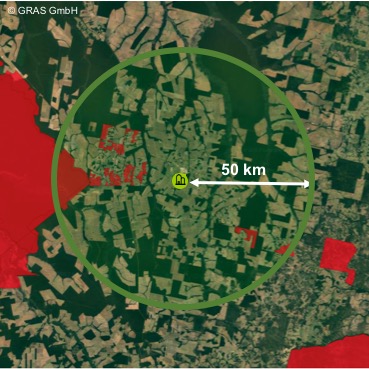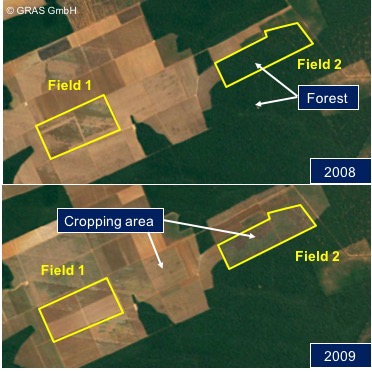Certification Support of a Soy Processing Facility
GRAS efficiently verifies compliance of a large number of supplying farmers prior to audits
To qualify for the export of oil produced from soy to the European biofuel market, a certification of the processing plant is necessary. The requirements of the European Renewable Energy Directive do not allow deforestation after January 2008 within the production area of supplying farmers, among other criteria. GRAS conducts semi-automated risk assessments of all supplying farmers and focuses detailed analyses on field level only on high risk farmers. This process reduces risks of potential noncompliance and related costs.
To reach the highest degree of efficiency, GRAS works with a combined approach of a semi-automated risk assessment and a detailed field analysis. This allows the efficient assessment of a large number of farmers and the reduction of the effort for the detection of non-compliances, and retaining highest levels of accuracy at the same time. This approach can also be used by the auditor himself during the sustainability audit to focus the on-field on sample farmers with highest risk values among the total number of supplying farmers. Further, potential investments can be checked against sustainability requirements before its too late.
The GRAS approach to analyse a large number of supplying farmers
GRAS performs a two-level-assessment for this analysis approach. In the beginning, the assumed sourcing areas of processing plants or of the single farms are assessed in a semi-automated process. For this purpose, GRAS collects and prepares all necessary datasets to conduct check of overlaps with the assumed sourcing areas. This includes heatmaps of potential land use change, datasets of protected areas and locations with a high protection status resulting from its high ecological value, carbon stock maps and social indices.
In the following step, the GRAS Risk Index is calculated for each farmer based on the results of the semi-automated risk assessment. For farmers with a high sustainability risk within their surrounding area, a detailed analysis of the specific production area on field level is recommended to confirm that the specific fields that belong the the farms are deforestation-free and do not violate other requirements. For this, high resolution satellite images of the area are analysed and the Enhanced Vegetation Index time series are processed and evaluated. Accordingly, compliance can be proven with highest accuracy for each single farmers.
Analysis results can be used for internal risk management and external communication
GRAS provides all analysis results in a concise and comprehensive summary report, which includes overview tables of analysis results and risk evaluation for each farmer. Additionally, an interactive tool can be set-up to facilitate an efficient internal management of the production area, smoothly incorporate the results into internal work flows and databases or to provide sustainability compliance to the public in an easy-to-use and secure online tool.
Find out more about how GRAS supports sustainability certification processes here.

Step 1: Risk assessment for the assumed sourcing area of the processing plant and supplying farmers and ranking

Step 2: Detailed sustainability assessment of the sampled farms